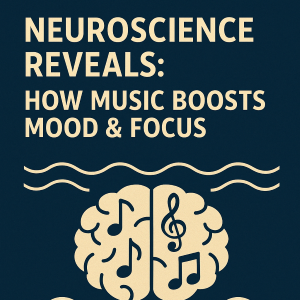


Neuroscience Confirms: How Music Boosts Mood & Focus
Discover how music improves happiness, creativity, and productivity. Backed by neuroscience, this blog reveals why your playlist is a brainpower tool.
Neuroscience Confirms It: Music Is the Brain’s Ultimate Emotion Regulation Machine
If you’ve ever felt chills from a melody or clarity from a beat drop, you’re not imagining it—science is catching up with what musicians and music lovers have known for generations. Recent findings in neuroscience now confirm that music isn’t just a vibe—it’s a powerful neurological tool for emotional regulation, creative flow, productivity, and even brain health. And now, researchers aren’t just proving its power—they’re quantifying its benefits with real-world data and applications that go far beyond the studio or concert hall.
Let’s dive deeper into the latest research and what it means for music creators, professionals, and anyone looking to level up their mental state with sound.
________________________________________
1. Music as an Emotion Regulation Engine
Researchers are now calling music an “emotion regulation machine” due to its measurable ability to influence the brain’s emotional processing. A groundbreaking 2022 study published in Nature involving over 30,000 participants across six continents found that simply listening to music at home boosted reported happiness levels by 11% and reduced irritability by 24%.
This isn’t a placebo effect—music interacts with core areas of the brain involved in mood regulation, such as the amygdala and ventral striatum. When we hear emotionally charged music, our brains release dopamine, the “feel-good” neurotransmitter, similarly to when we eat chocolate or experience physical affection.
For music therapists and mental health professionals, this positions music as a viable, non-pharmacological method of mood support—on par with mindfulness, cognitive behavioral therapy, or exercise.
________________________________________
2. Music’s Role in Enhancing Productivity
When it comes to performance at work, school, or creative tasks, the type of music you listen to matters. Studies from institutions like Stanford and MIT suggest that listening to music you personally enjoy can improve cognitive efficiency, particularly during repetitive or low-demand tasks.
Conversely, music that clashes with your personal taste—or includes lyrics during verbal processing tasks—can decrease focus and lead to mental fatigue. That’s because music influences the prefrontal cortex, the brain’s executive center responsible for decision-making and attention.
One 2023 study in Applied Cognitive Psychology showed that self-selected playlists improved focus by over 15% compared to silence or generic background music. In other words: your custom Spotify playlist may be the productivity tool you didn’t know you needed.
________________________________________
3. Music as a Catalyst for Creative Thinking
Creativity and music are deeply linked. Neuroscience suggests that music in the 50–80 BPM range—often found in ambient, lo-fi, and mellow pop genres—stimulates alpha brainwave activity. This “alpha state” is associated with relaxed focus, mental clarity, and spontaneous idea generation.
A 2021 review from Frontiers in Psychology concluded that listening to music at these tempos before or during creative activities, such as writing or design, enhanced divergent thinking (the ability to generate multiple solutions to a problem) by up to 60%.
This is why many writers, artists, and coders turn to carefully curated instrumental playlists to induce “flow state,” where time melts away and output soars.
________________________________________
4. The Neuroscience of Musical Joy
Want a mood boost? The formula is simple—and scientifically backed. Songs between 140–150 BPM, in a major key, with nonsensical or playful lyrics, are consistently rated as the most uplifting.
Neurologist Dr. Jacob Jolij from the University of Groningen analyzed decades of pop music data and identified this musical “happiness formula.” Tracks like Queen’s Don’t Stop Me Now and Katrina & The Waves’ Walking on Sunshine scored high on all three mood-lifting parameters.
But it’s not just passive listening that helps. Active musical engagement—like singing, drumming, or dancing—activates both hemispheres of the brain and produces even stronger dopamine surges. That’s why group music-making, like choir rehearsals or jam sessions, is being increasingly used in therapeutic and community wellness settings.
________________________________________
5. Music and Cognitive Function: The Memory Connection
While silence remains ideal for complex memory recall (such as studying for an exam), instrumental music can actually aid focus without introducing cognitive interference.
Lyrics, on the other hand, activate the brain’s language centers—distracting from tasks that also require verbal processing. That’s why classical, ambient, and minimalist electronica are popular among students, professionals, and even gamers seeking a mental edge.
Music is also being used in neurological rehabilitation. Music therapists now curate playlists for individuals with Alzheimer’s or post-stroke cognitive impairment. These personalized playlists can spark memory retrieval, emotional responses, and even improvements in speech fluency, as shown in research from Harvard Medical School and the American Music Therapy Association.
________________________________________
What This Means for Creators, Listeners, and Leaders
The growing scientific consensus is clear: music is more than an artform. It’s a multi-sensory toolkit for managing emotion, enhancing performance, and improving mental wellness.
For music creators and producers, this research underscores the importance of intentionality in song design—everything from tempo and key to lyrical tone can impact how a listener feels, thinks, and creates.
For listeners, especially those navigating daily stress, mental fog, or emotional lows, music offers a scientifically validated way to tune your mood—literally.
And for team leaders, educators, and therapists, integrating music into your work environment could be the untapped advantage you’ve been searching for.
________________________________________
Final Note: Tune In with Purpose
Whether you’re crafting a beat in your home studio, managing a deadline-heavy workday, or just decompressing at night, the soundtrack you choose matters. Neuroscience tells us that with the right rhythm, we’re not just hearing music—we’re reshaping our mental state.
So next time you hit play, remember: that track might be doing more for your brain than you think.